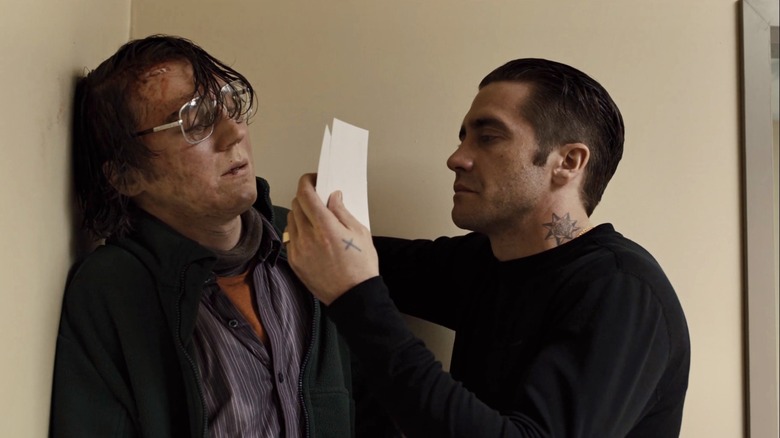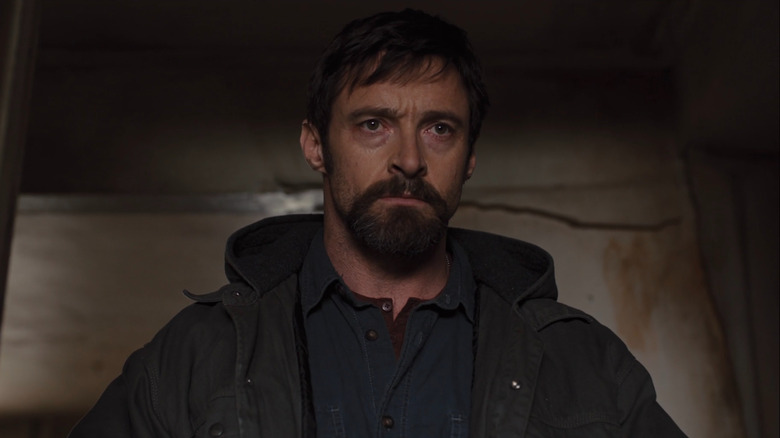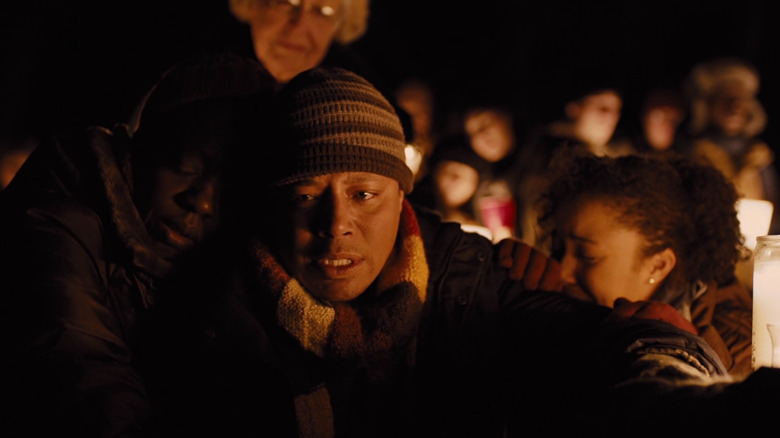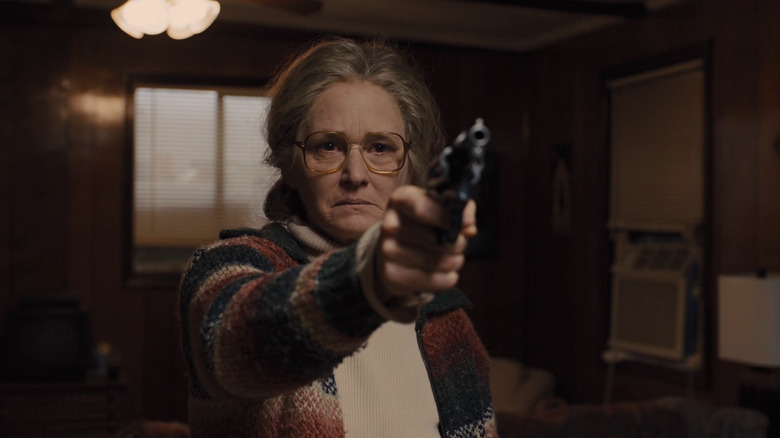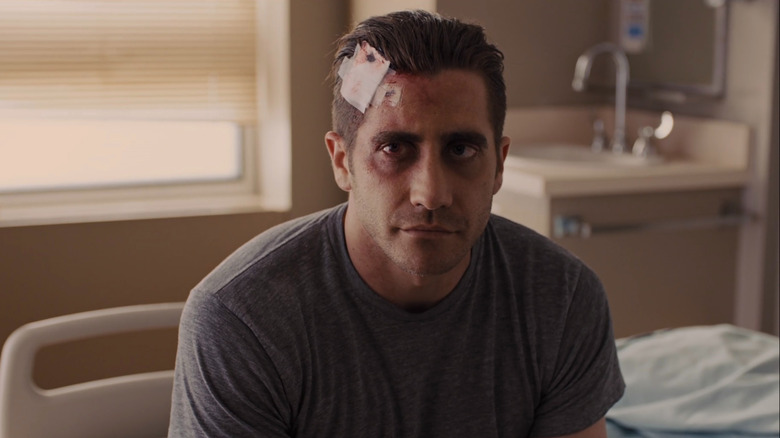Prisoners Ending Explained: Captive To A Vicious Circle Of Victimization
"Prisoners" marked the English-language crossover of Denis Villeneuve, the director of "Sicario" and sci-fi heir apparent to Ridley Scott (with films such as "Arrival," "Blade Runner 2049," and "Dune"). Though Villeneuve actually shot another warm-up film with Jake Gyllenhaal — the spidery doppelgänger thriller "Enemy" — before "Prisoners," its release would come after, meaning that "Prisoners" would be the first introduction to many stateside audiences for Villeneuve's work — unless they were already versed in his earlier French-language movies like "Incendies."
Whereas "Enemy" and "Sicario" are the length of standard movies, clocking in at 90 and 121 minutes, respectively, "Prisoners" is a longer film with a 153-minute runtime. Though it's still operating in thriller mode, the thrills are more drawn out amid the dark drama of two families dealing with the abduction of their girls. "Prisoners" was Villeneuve's first collaboration with both the late composer Jóhann Jóhannsson and director of photography Roger Deakins (who earned an Academy Award nomination for his cinematography), and it saw him working with a top-shelf cast, including Hugh Jackman, Jake Gyllenhaal, Viola Davis, Maria Bello, Terrence Howard, Melissa Leo, Paul Dano, Dylan Minnette, and David Dastmalchian.
"Prisoners" ends on a note that gives resolution to plot and characters arcs but also leaves the viewer to imagine what will happen next. If you hear a whistle blowing, that indicates spoilers, as we're about to delve into those and discuss the ending of Denis Villeneuve's "Prisoners."
Patient and penitent in affliction
"Prisoners" begins with a hunting scene, as Jackman's character, Keller Dover, recites the Lord's Prayer and his son Ralph, played by Minnette, trains a rifle on a deer. Dover is a religious man: he wears a cross around his neck and has one hanging from the rearview mirror in his truck. He says the most important thing his own father taught him was to be ready, and we'll see later that his basement is overstocked with emergency supplies, as if he wants to be especially well-prepared for judgment day coming like the proverbial "thief in the night" of scripture.
Despite this, Kellar is not at all prepared for what happens when his daughter goes missing.
In an interview with Go into the Story, "Prisoners" screenwriter Aaron Guzikowski discussed how Kellar's outwardly God-fearing nature and the "connections to Catholic iconography and Bible stories" in the movie and his overall writing stem from his upbringing. While not a practicing Catholic, Guzikowski draped "Prisoners" in some religious trappings that inform Keller's arc and the movie's ending.
After Kellar's daughter, Anna (Erin Gerasimovich), disappears, and suspicion falls on the mentally handicapped Alex Jones (Dano's character, not the controversial real-life radio host), we see Kellar take the law into his own hands, essentially playing God in the name of being a protective parent. At one point, we hear a preacher's voice on Kellar's car stereo talk about being "patient and penitent in affliction," but Kellar is having none of that. He becomes convinced that Alex knows something about where his daughter is. He's not entirely wrong about that, but he goes to extreme lengths to extract information from a man with the mental capacity of a 10-year-old.
As we forgive those who trespass against us
Ralph had spotted Alex's RV in the neighborhood before his sister and Kellar's daughter went missing, and the girls had been playing on it, which is what partially led Detective Loki (Gyllenhaal) and the police to arrest Alex and interrogate him. However, they could find no physical evidence of Anna having ever been in the RV.
As Alex is being let go, Kellar attacks him outside the police station. Later, after Kellar sees Alex being cruel to a dog and singing the "Batman smells" version of "Jingle Bells" (which Anna had been singing the day she disappeared), he kidnaps him and keeps him captive in his vacant house so he can conduct his own brutal interrogations.
Kellar involves the Birches, Franklin and Nancy (Howard and Davis), in his vigilantism since their daughter, Anna's playmate, Joy (Kyla-Drew Simmons) has also gone missing with Anna. Outside the police station, Kellar heard Alex say, "They didn't cry until I left them," thus implying that Alex knows something about where the girls are.
Franklin confronts Kellar with the question, "What if you're wrong? What if you only heard what you wanted to hear?" But Alex has his own justifications for the violence and torture he inflicts on Alex. His rationale, which he explains to Franklin, is, "He's not a person anymore. He stopped being a person when he took our daughters." Dehumanizing his prisoner goes against his own religion, however, and as he recites the Lord's Prayer again later in the movie, it's no longer so comfortable for Kellar to speak the "as we forgive those who trespass against us" part.
Snakes unlocked
In "Prisoners," Leo's character, Holly Jones, is supposed to be Alex's aunt. She says his parents died in a car accident, and her own husband walked out on her one day and never came back. However, when Loki is investigating another suspect, Father Dunn (Len Cariou), he finds a corpse in the cellar, and this corpse belongs to a man with a maze necklace that matches the one Holly's husband is wearing in an old photo.
This also connects the man to Bob Taylor (Dastmalchian), another suspect whose house holds many map drawings and locked containers full of live snakes and bloody children's clothes. Dunn told Loki that the dead man, Mr. Jones, was waging a war against God, and we eventually learn that he and Holly were doing it together after their son died of cancer.
When Kellar goes to confront Holly at her house, she tells him that she and her husband used to spend their summers driving around in a camper, "handing out pamphlets, spreading the good word." The loss of their son turned them against God, and they started making children disappear to make people "lose their faith" and "turn them into demons" like Kellar.
Alex, as it turns out, is the very first child that Holly and her husband abducted, all grown up now. He himself is a victim who had his emotional growth stunted by trauma at an early age. Bob was their second victim, and it left him similarly troubled, to the point where he winds up shooting himself after getting his hands on an officer's gun while in police custody.
Doing the Lord's work
In his zeal to find his daughter, Kellar unwittingly continued the cycle of abuse, hurting someone who "never laid a hand on his daughter." "Prisoners" almost seems to be headed for an ending like "The Vanishing" at first, as Holly holds Kellar at gunpoint, telling him to imbibe a drug if he wants to see his daughter again. In the end, it's Loki who saves the girls, while Kellar is left trapped below ground under a car in Holly's yard.
Though Loki's name links him to a mythological trickster of Norse mythology (namesake of the well-known Marvel character), that in and of itself may be a red herring. Loki, not Kellar, is the real hero of "Prisoners."
When we first meet Loki, he's eating alone in a Chinese restaurant on Thanksgiving. He has a nervous tic that causes him to blink a certain way, and when he's questioning Father Dunn, a registered sex offender, he reveals that he spent time at Huntington Boys Home, a place implied to have its own abusive history.
Loki has overcome the victimization loop to become one of the good guys. Rather than visiting the wrongs that were done to him on other people, he's doing the actual Lord's work, trying to help others. At the end, Alex is reunited with his family after 26 years, and Kellar is left calling for help, blowing the missing whistle that Anna and Joy went off to find in the first place. That whistle set in motion the plot of "Prisoners," so it's fitting that it brings the movie to a close. And though we don't see it, we can imagine that the sound of it will help Loki unearth Kellar after the film has faded to black.
